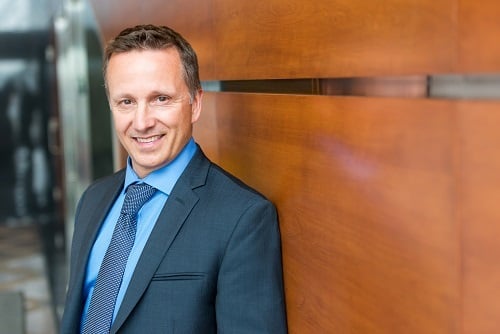For Dan Nolan, opening different communication channels is critical when it comes to legacy planning

Dan Nolan’s career in financial services began with an offer he couldn’t refuse.
“The woman I was dating in university and went on to marry me introduced me to her father,” Nolan recalled. “He was in the industry, and I got to know a little bit about what he was doing. I graduated around 1992, and he offered me a job, which I thought was quite interesting.”
He accepted and soon found himself learning the ropes. Because of his father-in-law’s background, Nolan learned to look at clients’ problems from a financial-planning standpoint. Looking back, he says he was very lucky to be involved with someone who was multidimensional and not just focused on financial products.
“The fact that we look for a complete understanding of the financial picture of a client rather than a segment of it has been a huge factor in us growing our business,” said Nolan, who now runs his own practice with IPC Securities. “We have a family-based approach as well, which I think is critical for getting to know your client’s current needs as well as those of the next generation.”
As an investment advisor responsible for assets typically at the $1 million range or above, Nolan uses communication as a lynchpin to his business. Communication plans are ironed out a year in advance to define when he will get in touch with clients; he uses those times to go over major concerns, which include legacy planning.
“Most would have estate value because they can’t spend all their resources by the end of their time,” he explained. “Minimizing tax consequences to help put more of it where they actually want it to go is the legacy challenge I deal with most often.”
Charitable giving is one important aspect of Nolan’s practice. He’s helped clients evaluate different charities and determine the best giving option, whether it’s by giving a gift or naming an organization as a beneficiary of their estate. More frequently, he guides clients through intergenerational wealth transfers, planning an equal and tax-efficient distribution of money among family members.
“Some people would prefer to let beneficiaries enjoy their wealth while they’re alive,” Nolan added. “I often tell my clients that if this money will be put to good use and help your family as they move forward, then gifting is a great idea; it lets clients sidestep taxes, and they get to see their beneficiaries thrive from the money.”
To address worries about heirs who might mishandle a lump-sum endowment, Nolan could recommend that a trust be set up; more frequently, he facilitates simple family meetings where issues are aired out and resolved.
While scheduled client meetings and family discussions are useful, they’re not the only communication channels he opens. He also organizes a range of social events with high-value clients, such as lunches, dinners, and wine or beer tastings — always intimate affairs, to ensure each guest gets the proper amount of attention. Aside from that, he and his wife occasionally go on double dates with client couples.
“The goal is to become more personal with clients and get to know more about their lives,” he said. “I think getting together with clients and talking about things other than money is really critical in building trust. In my experience, the social discussions are what lead to greater transparency, a greater knowledge of what makes them tick, their hopes, their dreams … that’s where the real goods come out.”
That focus on relationships and advice rather than financial products has allowed Nolan to benefit from CRM2 and efforts to ban embedded commissions. On the tax front, he has experienced minor difficulties from new rates and the removal of corporate tax breaks for businesses, which he sees as system-wide changes that people will simply have to adjust to.
“I do think robo-advice is a fascinating new way of looking at things,” he said. “Companies like WealthSimple are brilliant because they’ve got an absolutely flawless, quick, and easy onboarding process. What they haven’t done, however, is work hard enough to attract high-net-worth investors for the most part.”
The high-net-worth space, Nolan observed, prizes overall stewardship of wealth. While robo-advisors aren’t able to provide that yet, he imagines robo platforms will eventually tailor more plans to address complex needs. That would appeal to younger generations, millennials and below, who are more open to digital transactions and certain other changes.
“I think the robos will never get to a point where they can do everything we do from an inter-generational or legacy planning standpoint, although I think they can attract larger clients whose needs don’t go far outside product-based planning solutions,” he added. “The investment world’s a big place, and I think there’s room enough for both of us.”
Related stories:
Fostering a multigenerational focus
Canadian HNWIs seek legacies based on impact, relationships



